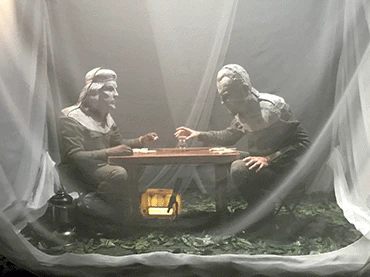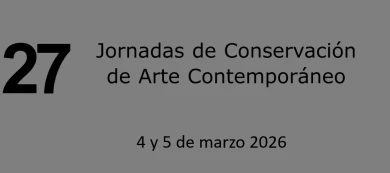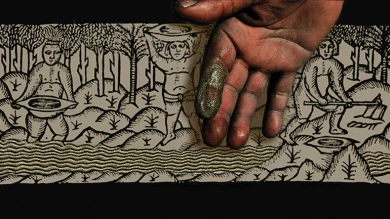
Mapa Teatro. La despedida [The farewell], 2017
Held on 04 Apr 2019
As part of the performing arts program designed by Teatros del Canal and Museo Reina Sofía,The Living Museum (2019) is a new production — premiered internationally in the Museo Reina Sofía — by Mapa Teatro, and the collective’s coda to the Museo’s Fissures programme (with the exhibition Of Lunatics, or Those Lacking Sanity, until 29 April 2019). In fact, the work continues the research on madness, primitive accumulation, extractivism and colonial exploitation started in the show mentioned above.
The piece unfolds on the auditorium stage, yet, as with Mapa Teatro’s work as a whole, it melds visual art discourses and mediums with contemporary theatre. Fiction and reality overlap in a game of mirrors, in resignifying and slides, where reality acts as fiction and fiction documents reality. The work reveals three layers of meaning in different devices and languages: the monologue of a miner from the Colombian mine Marmato, recreated by the artists in their installation Of Lunatics, or Those Lacking Sanity; an audiovisual piece on the hypothetical encounter in the jungle between a shaman and Karl Marx, where the magic and animist world of ritual converges with the production machinery of capital; and a film installation on a group of Colombian soldiers who created and ran a museum in El Borugo, a former FARC camp located in the Amazon rainforest, in which soldiers re-staged, under the visitors’ gaze, the conditions of their imprisoned and tortured comrades.
The Living Museum sees Mapa Teatro delve deeper into the tradition of documentary theatre, opening up contemporary folds between dramaturgy and performance and reflecting on the use of the museum institution in memory, collective peace processes and the manufacturing of history.
Activity inside of the programme
In collaboration with
Teatros del Canal de la Comunidad de Madrid
Organised by
Museo Reina Sofía
In collaboration with
Participants
Mapa Teatro is an artists’ laboratory devoted to transdisciplinary creation which has been based in Bogotá since 1986, and was founded in Paris in 1984 by Colombian visual and theatre artists Heidi, Elizabeth and Rolf Abderhalden. Their work interweaves experimental performance, installation, opera, theatre and ethnological documentary-making, and has been shown at international performance festivals such as the Avignon Festival, the Paris Autumn Festival and the FIND Festival in Berlin, as well as art institutions that include the São Paulo Biennial and the San Francisco Museum of Modern Art (SFMOMA).
Credits
Concept, dramaturgy and directors: Heidi y Rolf Abderhalden
With the participation of: Heidi Abderhalden, Rolf Abderhalden, Andrés Castañeda, Rubén Darío Rotavista y Santiago Sepúlveda
Technical director: Jean François Dubois
Light design: Jean François Dubois
Live video: Ximena Vargas and Federico Paladino

![Mapa Teatro. La despedida [The farewell], 2017](https://recursos.museoreinasofia.es/styles/large_landscape/public/Actividades/2-mapa.gif.webp)
![Mapa Teatro. La despedida [The farewell], 2017](https://recursos.museoreinasofia.es/styles/large_landscape/public/Actividades/3-mapa.gif.webp)
Más actividades

Difficulty. Forms and Political Effects of Deviation in Writing and Contemporary Art
23 February – 14 December 2026 – Check programme
Difficulty. Forms and Political Effects of Deviation in Writing and Contemporary Art is a study group aligned towards thinking about how certain contemporary artistic and cultural practices resist the referentiality that dominates the logics of production and the consumption of present-day art. At the centre of this proposal are the concepts of difficulty and deviation, under which it brings together any procedure capable of preventing artistic forms from being absorbed by a meaning that appears previous to and independent from its expression. By ensuring the perceptibility of their languages, difficulty invites us to think of meaning as the effect of a signifying tension; that is, as a productive and creative activity which, from the materiality of art objects, frees aesthetic experience from the representational mandate and those who participate in it from the passiveness associated with tasks of mimesis and decoding.
The economy of the referential norm translates the social logic of capitalism, where insidious forms of capturing subjectivity and meaning operate. In the early 1980s, and adopting a Marxist framework, poet Ron Silliman highlighted how this logic entailed separating language from any mark, gesture, script, form or syntax that might link it to the conditions of its production, rendering it fetichised (as if without a subject) and alienating its users in a use for which they are not responsible. This double dispossession encodes the political strategy of referential objectivity: with no subject and no trace of its own consistency, language is merely an object, that reality in which it disappears.
The political uses of referentiality, more sophisticated today than ever before, sustain the neoliberal-extractivist phase of capitalism that crosses through present-day societies politically, economically and aesthetically. Against them, fugitive artistic practices emerge which, drawing from Black and Queer studies and other subaltern critical positions, reject the objective limits of what exists, invent forms to name what lies outside what has already been named, and return to subjects the capacity to participate in processes of emission and interpretation.
Read from the standpoint of artistic work, the objective capture of referentiality may be called transparency. Viewed from a social contract that reproduces inequality in fixed identity positions, transparent in this objectivity are, precisely, the discourses that maintain the status quo of domination. Opposite the inferno of these discourses, this group aims to collectively explore, through deviant or fugitive works, the paradise of language that Monique Wittig encountered in the estranged practices of literature. For the political potency of difficulty — that is, its contribution to the utopia of a free language among equals — depends on making visible, first, its own deviations; from there, the norm that those deviations transgress; and finally, the narrowness of a norm which in no way exhausts the possibilities ofsaying, signifying, referring and producing a world.
From this denouncement of referential alienation, fetishisation and capture, Difficulty. Forms and Political Effects of Deviation in Writing and Contemporary Art turns its attention to the strategies of resistance deployed by contemporary artists and poets. Its interest is directed towards proposals as evidently difficult or evasive as those of Gertrude Stein, Lyn Hejinian, Theresa Hak Kyung Cha, Kameelah Janan Rasheed, Kathy Acker, María Salgado and Ricardo Carreira, and as seemingly simple as those of Fernanda Laguna, Felix Gonzalez Torres and Cecilia Vicuña, among other examples that can be added according to the desires and dynamics of the group.
The ten study group sessions, held between February and December, combine theoretical seminars, work with artworks from the Museo Reina Sofía’s Collections and exhibitions, reading workshops and public programs. All these formats serve as spaces of encounter to think commonly about certain problems of poetics — that is, certain political questions — of contemporary writing and art.
Difficulty. Forms and Political Effects of Deviation in Writing and Contemporary Art inaugurates the research line Goodbye, Representation, through which the Museo Reina Sofía’s Studies Directorship seeks to explore the emergence of contemporary artistic and cultural practices which move away from representation as a dominant aesthetic-political strategy and redirect their attention toward artistic languages that question the tendency to point, name and fix, advocating instead for fugitive aesthetics. Over its three-year duration, this research line materializes in study groups, seminars, screenings and other forms of public programming.

CLINIC 2628. A Community of Writing and Research in the Arts
February – October 2026
Clinic 2628 is a project which supports and brings together writings which stem from the intention to offer a space and sustainable time for research work in art and culture. Framed within an academic context which is increasingly less receptive to the forms in which thinking happens and is expressed, the aim is to rescue the academic from its neoliberal trappings and thus recover the alliance between precision and intuition, work and desire. A further goal is to return writing to a commons which makes this possible through the monitoring of processes and the collectivisation of ideas, stances, references and strategies.
The endeavour, rooted in a collaboration between the Museo Reina Sofía’s Studies Directorship and the Artea research group, via the i+D Experimenta project, is shaped by three annual editions conceived as spaces of experimentation, discussion and a demonstration of writings critical of what is put forward by today’s academia.
What forces, forms and processes are at play when writing about art and aesthetics? In academia, in museums and in other cultural institutions, the practice of writing is traversed by productivist logics which jeopardise rhythms of research and experimentation. The imposition of both scientism inherent in the structure of “the paper” and the quantifying of results which demand a criterion of quality and visibility sterilise and smoothen, from the outset, the coarseness that is particular to writing understood from the concrete part of language: phonic, graphic, syntactic and grammatical resistance connecting the language user to the community the language unites and activates. They also sterilise the roughness enmeshed in the same desire to write, the intuitive, clear and confusing pathways that once again connect the writer to those reading and writing, participating in a common good that is at once discovered and produced.
The progressive commercialisation of knowledge propelled by cognitive capitalism moves further away from the research and production of knowledge in artworks and artistic languages and practices. The work of curators and archive, criticism, performances and essays formerly saw a horizon of formal and emotional possibilities, of imagination that was much broader when not developed in circumstances of competition, indexing and impact. Today, would it be possible to regain, critically not nostalgically, these ways; namely, recovering by forms, and by written forms, the proximity between art thinking and its objects? How to write in another way, to another rhythm, with no more demands than those with which an artwork moves towards different ways of seeing, reading and being in the world?

27th Contemporary Art Conservation Conference
Wednesday, 4, and Thursday, 5 March 2026
The 27th Contemporary Art Conservation Conference, organised by the Museo Reina Sofía’s Department of Conservation and Restoration, with the sponsorship of the MAPFRE Foundation, is held on 4 and 5 March 2026. This international encounter sets out to share and debate experience and research, open new channels of study and reflect on conservation and the professional practice of restorers.
This edition will be held with in-person and online attendance formats, occurring simultaneously, via twenty-minute interventions followed by a five-minute Q&A.
Submitting Proposals
The deadline for presenting proposals ends on 28 September 2025. Those interested must send an email to jornada.conservacion@museoreinasofia.es, submitting the following documents:
- An unpublished proposal related to the conservation or restoration of contemporary art.
- A 1,700-word summary, written in Word, on the theme addressed. Please indicate the topic at the top of the document with five keywords and the presentation format (in-person or virtual). Preference will be given to the in-person format.
- CV and contact details.
- Only one proposal per person will be accepted.
- Proposals related to talks given in the last three conferences will not be accepted.
Proposals may be submitted in Spanish, French or English and will be evaluated by a Scientific Committee, which will select the submissions to be presented during these conference days and will determine their possible participation in a subsequent publication, the inclusion of which will undergo a second and definitive evaluation by the Editorial Committee.
For submissions in a virtual format, participants must send a recording following certain technical requirements they will receive once participation is confirmed.
The programme of sessions will be published in the coming days.

Cultural Work
Thursday, 12 February 2026 – 5:30pm
This series is organised by equipoMotor, a group of teenagers, young people and older people who have participated in the Museo Reina Sofía’s previous community education projects, and is structured around four themed blocks that pivot on the monstrous.
Session number two looks to approach film as a place from which cultural work is made visible and processes of production engage in dialogue with artistic creation. From this premise, the session focuses on exploring how audiovisual content is produced, assembled and distributed, from the hands that handle the images to the bodies that participate in its circulation. The aim is to reflect on the invisible effort, precarity and forms of collaboration that uphold cultural life, that transform the filmic experience into an act that recognises and cares for common work.
![Basel Abbas y Ruanne Abou-Rahme, At Those Terrifying Frontiers Where the Existence and Disappearance of People Fade Into Each Other [En esas fronteras aterradoras donde la existencia y la desaparición de personas se disuelven entre sí], 2019](https://recursos.museoreinasofia.es/styles/small_landscape/public/Colecci%C3%B3n/abbasabourahme.png.webp)
Gaza and Aestheticide
Tuesday February 10, 2026 – 16:00 h
This seminar examines the systematic destruction of Palestinian collective sensibility — what we might call “aestheticide” — that has accompanied Israel’s genocide and ecocide in Gaza, and considers the conditions of artistic practice in its aftermath. Over more than two years, the demolition of universities, archives, museums, and libraries has not only erased cultural and intellectual infrastructure but has also targeted the very possibility of representation itself. The destruction of a people has been accompanied by the destruction of their image, their history, and their capacity to be known: reportage, scholarship, and cultural memory have been deliberately undermined, with media institutions, universities, and museums often complicit in this repression. Gaza consequently functions as a rehearsal space for a possible global future — of fascism, post-liberal authoritarianism, militarized borders, and AI-enabled warfare —, a laboratory for an emerging world order. What, then, becomes of critical analysis and resistance under these conditions? And what becomes of aesthetics and politics?
This seminar takes place thanks to the art historian’s invitation to Spain by the Miró Foundation. In the context of the museum, it engages in dialogue with a broader line of work on the climate emergency and decolonial perspectives developed within the Museum of the Commons project (2023–2026) of the L’Internationale network, of which the Museo Reina Sofía is a member; as well as with some of the questions that animate the study group Aesthetics of Peace and Desertion Tactics. Finally, it is also embedded in a wider strategy of support for and commitment to the artistic and discursive practices of Palestinian artists and cultural practitioners, most clearly reflected in the TEJA network.
